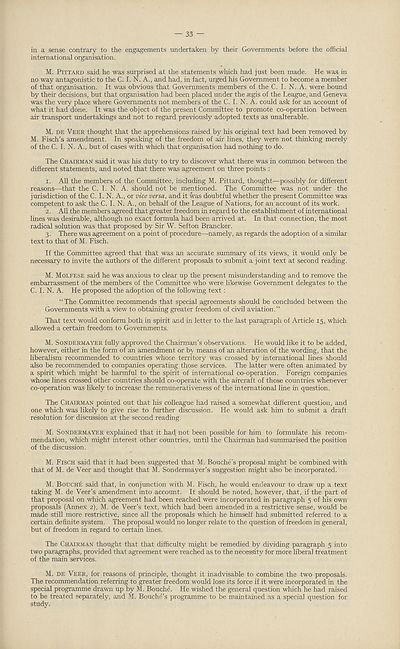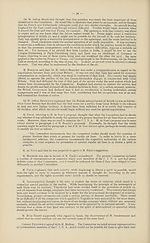Communications and transit > Air transport co-operation committee : minutes of the first session : held at Geneva from July 8th to 12th, 1930
(33)
Download files
Complete book:
Individual page:
Thumbnail gallery: Grid view | List view

33 —
in a sense contrary to the engagements undertaken by their Governments before the official
international organisation.
M. Pittard said he was surprised at the statements which had just been made. He was in
no way antagonistic to the C. I. N. A., and had, in fact, urged his Government to become a member
of that organisation. It was obvious that Governments members of the C. I. N. A. were bound
by their decisions, but that organisation had been placed under the aegis of the League, and Geneva
was the very place where Governments not members of the C. I. N. A. could ask for an account of
what it had done. It was the object of the present Committee to promote co-operation between
air transport undertakings and not to regard previously adopted texts as unalterable.
M. de Veer thought that the apprehensions raised by his original text had been removed by
M. Fisch’s amendment. In speaking of the freedom of air lines, they were not thinking merely
of the C. I. N. A., but of cases with which that organisation had nothing to do.
The Chairman said it was his duty to try to discover what there was in common between the
different statements, and noted that there was agreement on three points :
1. All the members of the Committee, including M. Pittard, thought—possibly for different
reasons—that the C. I. N. A. should not be mentioned. The Committee was not under the
jurisdiction of the C. I. N. A., or vice versa, and it was doubtful whether the present Committee was
competent to ask the C. I. N. A., on behalf of the League of Nations, for an account of its work.
2. All the members agreed that greater freedom in regard to the establishment of international
lines was desirable, although no exact formula had been arrived at. In that connection, the most
radical solution was that proposed by Sir W. Sefton Brancker.
3. There was agreement on a point of procedure—-namely, as regards the adoption of a similar
text to that of M. Fisch.
If the Committee agreed that that was an accurate summary of its views, it would only be
necessary to invite the authors of the different proposals to submit a joint text at second reading.
M. Molfese said he was anxious to clear up the present misunderstanding and to remove the
embarrassment of the members of the Committee who were likewise Government delegates to the
C. I. N. A. He proposed the adoption of the following text :
“The Committee recommends that special agreements should be concluded between the
Governments with a view to obtaining greater freedom of civil aviation.”
That text would conform both in spirit and in letter to the last paragraph of Article 15, which
allowed a certain freedom to Governments.
M. Sondermayer fully approved the Chairman’s observations. He would like it to be added,
however, either in the form of an amendment or by means of an alteration of the wording, that the
liberalism recommended to countries whose territory was crossed by international lines should
also be recommended to companies operating those services. The latter were often animated by
a spirit which might be harmful to the spirit of international co-operation. Foreign companies
whose lines crossed other countries should co-operate with the aircraft of those countries whenever
co-operation was likely to increase the remunerativeness of the international line in question.
The Chairman pointed out that his colleague had raised a somewhat different question, and
one which was likely to give rise to further discussion. He would ask him to submit a draft
resolution for discussion at the second reading.
M. Sondermayer explained that it had. not been possible for him to formulate his recom¬
mendation, which might interest other countries, until the Chairman had summarised the position
of the discussion.
M. Fisch said that it had been suggested that M. Bouche’s proposal might be combined with
that of M. de Veer and thought that M. Sondermayer’s suggestion might also be incorporated.
M. Bouche said that, in conjunction with M. Fisch, he would endeavour to draw up a text
taking M. de Veer’s amendment into account. It should be noted, however, that, if the part of
that proposal on which agreement had been reached were incorporated in paragraph 5 of his own
proposals (Annex 2), M. de Veer’s text, which had been amended in a restrictive sense, would be
made still more restrictive, since all the proposals which he himself had submitted referred to a
certain definite system. The proposal would no longer relate to the question of freedom in general,
but of freedom in regard to certain lines.
The Chairman thought that that difficulty might be remedied by dividing paragraph 5 into
two paragraphs, provided that agreement were reached as to the necessity for more liberal treatment
of the main services.
M. de Veer, for reasons of principle, thought it inadvisable to combine the two proposals.
The recommendation referring to greater freedom would lose its force if it were incorporated in the
special programme drawn up by M. Bouche. He wished the general question which he had raised
to be treated separately, and M. Bouche’s programme to be maintained as a special question for
study.
in a sense contrary to the engagements undertaken by their Governments before the official
international organisation.
M. Pittard said he was surprised at the statements which had just been made. He was in
no way antagonistic to the C. I. N. A., and had, in fact, urged his Government to become a member
of that organisation. It was obvious that Governments members of the C. I. N. A. were bound
by their decisions, but that organisation had been placed under the aegis of the League, and Geneva
was the very place where Governments not members of the C. I. N. A. could ask for an account of
what it had done. It was the object of the present Committee to promote co-operation between
air transport undertakings and not to regard previously adopted texts as unalterable.
M. de Veer thought that the apprehensions raised by his original text had been removed by
M. Fisch’s amendment. In speaking of the freedom of air lines, they were not thinking merely
of the C. I. N. A., but of cases with which that organisation had nothing to do.
The Chairman said it was his duty to try to discover what there was in common between the
different statements, and noted that there was agreement on three points :
1. All the members of the Committee, including M. Pittard, thought—possibly for different
reasons—that the C. I. N. A. should not be mentioned. The Committee was not under the
jurisdiction of the C. I. N. A., or vice versa, and it was doubtful whether the present Committee was
competent to ask the C. I. N. A., on behalf of the League of Nations, for an account of its work.
2. All the members agreed that greater freedom in regard to the establishment of international
lines was desirable, although no exact formula had been arrived at. In that connection, the most
radical solution was that proposed by Sir W. Sefton Brancker.
3. There was agreement on a point of procedure—-namely, as regards the adoption of a similar
text to that of M. Fisch.
If the Committee agreed that that was an accurate summary of its views, it would only be
necessary to invite the authors of the different proposals to submit a joint text at second reading.
M. Molfese said he was anxious to clear up the present misunderstanding and to remove the
embarrassment of the members of the Committee who were likewise Government delegates to the
C. I. N. A. He proposed the adoption of the following text :
“The Committee recommends that special agreements should be concluded between the
Governments with a view to obtaining greater freedom of civil aviation.”
That text would conform both in spirit and in letter to the last paragraph of Article 15, which
allowed a certain freedom to Governments.
M. Sondermayer fully approved the Chairman’s observations. He would like it to be added,
however, either in the form of an amendment or by means of an alteration of the wording, that the
liberalism recommended to countries whose territory was crossed by international lines should
also be recommended to companies operating those services. The latter were often animated by
a spirit which might be harmful to the spirit of international co-operation. Foreign companies
whose lines crossed other countries should co-operate with the aircraft of those countries whenever
co-operation was likely to increase the remunerativeness of the international line in question.
The Chairman pointed out that his colleague had raised a somewhat different question, and
one which was likely to give rise to further discussion. He would ask him to submit a draft
resolution for discussion at the second reading.
M. Sondermayer explained that it had. not been possible for him to formulate his recom¬
mendation, which might interest other countries, until the Chairman had summarised the position
of the discussion.
M. Fisch said that it had been suggested that M. Bouche’s proposal might be combined with
that of M. de Veer and thought that M. Sondermayer’s suggestion might also be incorporated.
M. Bouche said that, in conjunction with M. Fisch, he would endeavour to draw up a text
taking M. de Veer’s amendment into account. It should be noted, however, that, if the part of
that proposal on which agreement had been reached were incorporated in paragraph 5 of his own
proposals (Annex 2), M. de Veer’s text, which had been amended in a restrictive sense, would be
made still more restrictive, since all the proposals which he himself had submitted referred to a
certain definite system. The proposal would no longer relate to the question of freedom in general,
but of freedom in regard to certain lines.
The Chairman thought that that difficulty might be remedied by dividing paragraph 5 into
two paragraphs, provided that agreement were reached as to the necessity for more liberal treatment
of the main services.
M. de Veer, for reasons of principle, thought it inadvisable to combine the two proposals.
The recommendation referring to greater freedom would lose its force if it were incorporated in the
special programme drawn up by M. Bouche. He wished the general question which he had raised
to be treated separately, and M. Bouche’s programme to be maintained as a special question for
study.
Set display mode to:
![]() Universal Viewer |
Universal Viewer | ![]() Mirador |
Large image | Transcription
Mirador |
Large image | Transcription
Images and transcriptions on this page, including medium image downloads, may be used under the Creative Commons Attribution 4.0 International Licence unless otherwise stated. ![]()
| League of Nations > Communications and transit > Air transport co-operation committee : minutes of the first session : held at Geneva from July 8th to 12th, 1930 > (33) |
|---|
| Permanent URL | https://digital.nls.uk/194043776 |
|---|
| Shelfmark | LN.VIII |
|---|
| Description | Over 1,200 documents from the non-political organs of the League of Nations that dealt with health, disarmament, economic and financial matters for the duration of the League (1919-1945). Also online are statistical bulletins, essential facts, and an overview of the League by the first Secretary General, Sir Eric Drummond. These items are part of the Official Publications collection at the National Library of Scotland. |
|---|---|
| Additional NLS resources: |
|

